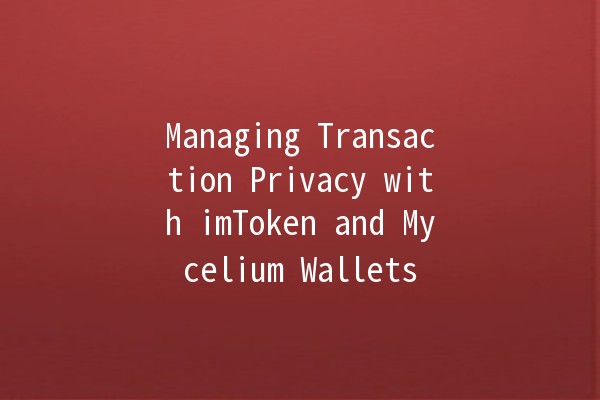In the realm of cryptocurrency, privacy has emerged as one of the most critical concerns for users. As digital assets become increasingly mainstream, protecting transaction details from prying eyes is paramount. In this article, we will delve into how two popular wallets, imToken and Mycelium, manage transaction privacy, providing practical insights and productivityenhancing tips for users.
Transaction privacy refers to the protection of sensitive information associated with digital asset transfers. This includes the amounts transacted, wallet addresses, and the transaction history of a user. With the rise of blockchain analytics, even though blockchain technology boasts a degree of anonymity, individuals can still be traced back through their transaction patterns.

Both imToken and Mycelium have incorporated various techniques to safeguard user privacy. Here's how they stand out:
Explanation: This technique involves using a unique wallet address for each transaction.
Example: For instance, when sending funds, instead of reusing a previously used address, generate a new one to cut down on traceability.
Explanation: Some cryptocurrencies such as Monero and Zcash are specifically built for privacy.
Example: If you anticipate needing high levels of privacy, consider converting your assets to privacy coins before sending or receiving funds.
Explanation: Keeping the wallet updated ensures you have the latest security features.
Example: Set up notifications or reminders to check for updates in imToken and Mycelium periodically.
Explanation: Understanding how data can be analyzed on the blockchain will help you develop better privacy practices.
Example: Researching on platforms like Cointelegraph or forums on crypto analysis can provide you insights on maintaining privacy.
Explanation: Using a Virtual Private Network (VPN) while transacting can obscure your IP address, adding an extra layer of privacy.
Example: When using Mycelium, connect to a trusted VPN before performing transactions to conceal your online activities.
imToken secures private keys by storing them locally on the user's device. The wallet uses advanced encryption techniques and does not transmit sensitive information over the internet, which minimizes the risk of remote attacks.
Yes, imToken and Mycelium both offer recovery options. Users can set up a recovery phrase during wallet creation, which can be used to restore access to funds in case of loss. It is crucial to keep this recovery phrase secure and private.
Using public WiFi poses significant security risks, including the threat of data interception by malicious actors. Avoid conducting transactions on unsecured networks, or use a VPN to encrypt your connection.
Yes, you can transfer assets between wallets while maintaining privacy. Utilize unique addresses and privacyenhancing services like coin mixing to obfuscate the transaction details.
While complete anonymity is challenging, you can enhance privacy by using methods like coin mixing, privacy coins, and Tor integration. Always adopt additional security measures such as VPNs and HD wallets for better results.
Yes, using privacyenhancing features could attract attention from regulatory authorities. It's essential to stay informed about the legal landscape regarding cryptocurrency privacy in your jurisdiction to avoid potential legal issues.
Transaction privacy is a critical consideration in today’s digital asset landscape. Understanding the capabilities of wallets like imToken and Mycelium can empower users to take control of their transaction privacy. By employing recommended techniques and staying informed about the latest developments, users can enhance their security and maintain the integrity of their cryptocurrency activities. Embrace the power of privacy today!